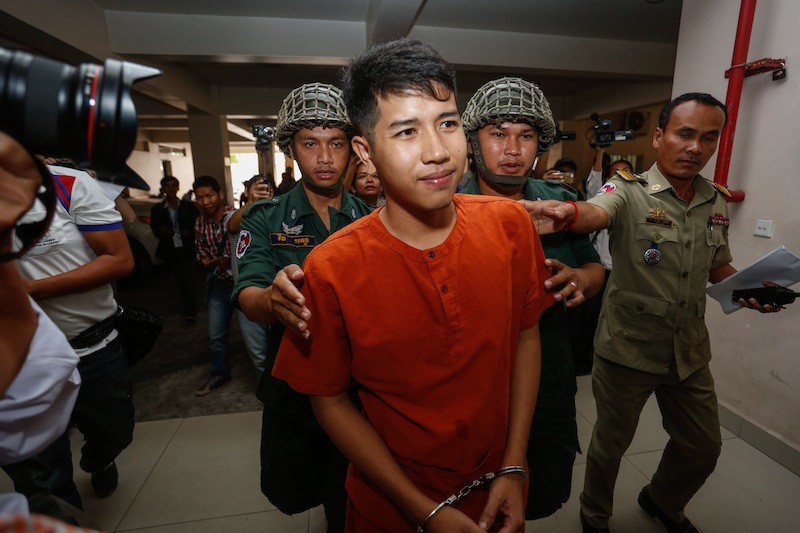A university student who called for a “color revolution” in a Facebook post last year was on Tuesday sentenced to 18 months in prison by the Phnom Penh Municipal Court, a decision that critics immediately labeled an attempt to muzzle freedom of expression.
“The court has decided to sentence Kung Raiya…to one year and six months on charges of incitement to commit a felony committed in Phnom Penh,” Presiding Judge Heng Sokna announced to a packed courtroom shortly before 3 p.m.

Mr. Raiya was arrested by police from the Interior Ministry’s central security department while walking to class at Phnom Penh’s Khemarak University on the afternoon of August 21. The 25-year-old political science student was subsequently charged with incitement for asking in a Facebook post two weeks earlier if anyone would “dare to make a color revolution with me?”
His lawyer, Sam Sokong, decried his client’s 18-month prison sentence, calling it an absurd punishment for a young man guilty only of expressing himself online.
“He thought that in a democratic society freedom of expression would be respected. But when he exercised his right he was charged for it,” Mr. Sokong said. “I think freedom of expression was violated in our country.”
“The sentence itself is serious, based on the possible sentence stated in the law,” he added. Incitement to commit a felony carries a maximum penalty of two years’ imprisonment.
Speaking outside the courtroom, a defiant Mr. Raiya said he would appeal the verdict and questioned the integrity of the country’s judiciary.
“This is nothing unusual for the courts in Cambodia. It is just like this,” Mr. Raiya said. “This is not only unjust for me, but also unjust for the entire Cambodian people.”
Am Sam Ath, technical supervisor for rights group Licadho, said the decision constituted a “threat” by the government aimed at stifling political debate through fear.
“It is a strategy and an example to hinder or threaten the expression of other youth,” he said.
Opposition lawmaker Mu Sochua agreed.
“It is a chilling warning to the youth who have taken to Facebook as a channel for self-expression,” she said.
One month before Mr. Raiya called for a “color revolution,” a term almost exclusively used to describe nonviolent demonstrations, Prime Minister Hun Sen’s opinions on the subject were made clear in a statement released by the Council of Ministers.
“Hun Sen asked the armed forces to ensure that a ‘color revolution’ cannot take place in Cambodia,” the July statement read.
Council spokesman Phay Siphan said on Tuesday that while the decision to imprison Mr. Raiya was made at the “discretion of the court,” he hoped the public would take heed.
“Asking the people to be together and hold a color revolution is not acceptable,” he said. “As a message sent out to the country and across the nation, anyone, don’t try to provoke any revolution in Cambodia.”
The message was received loud and clear by some of Mr. Raiya’s peers.
Chrey Bora, 24, a Khemarak University student, on Sunday dropped off a petition calling for Mr. Raiya’s release to various government bodies.
“I think most all the students of all universities in Cambodia…they feel afraid of posting and sharing any news related to the government,” he said.
“It seems like a communist country; people do not have enough rights.”